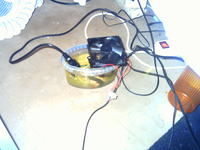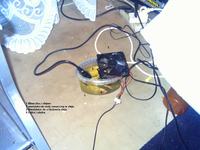FAQ
TL;DR: Immersing a PC in mineral transformer oil (dielectric strength ≈ 30 kV/mm [IEC 60296]) works if you manage heat and sealing; “Oil will enter EVERYWHERE” [Elektroda, jankolo, post #4767577] Open-loop tanks still need active cooling to keep oil ≤ 60 °C.
Why it matters: This FAQ helps makers decide if full-oil immersion is safe, affordable, and reversible for hobby PCs.
Quick Facts
• Dielectric strength of fresh transformer oil: 25-30 kV/mm [IEC 60296].
• Viscosity at 40 °C: 8-12 mm²/s [IEC 60296].
• Thermal conductivity: ≈ 0.13 W/m·K, 50 % higher than air [Gustavsson, 2020].
• Market price in EU: €2–4 per litre (5 L cans, 2024 retail).
• Keep bulk oil ≤ 60 °C to meet typical silicon junction limits [Intel ARK, 2023].
Does HAUSGOLD cooking oil conduct electricity?
Fresh vegetable oil is nearly non-conductive, but it oxidises and forms acidic compounds that absorb moisture, so conductivity and corrosion rise within weeks [Elektroda, Grasser, post #4766946]
Why do hobbyists prefer transformer oil over vegetable oil for submersion cooling?
Mineral transformer oil resists oxidation, stays neutral, has higher dielectric strength, and does not turn rancid or smell [Elektroda, tronic1, post #4766906] It also meets IEC 60296 purity specs, cutting corrosion risk.
Where can I buy small amounts of transformer oil?
Ask local electrical-equipment repair shops, refrigeration-parts stores, or transformer stations; forum users sourced litres from energy-utility fitters [Elektroda, Rysio4001, #4767186; tronic1, #4767131].
Will an oil film stop RAM, PCIe, or power contacts from working?
A thin film coats every surface, but tight, pre-mated contacts usually pierce it; oil-immersed contactors prove reliable under similar pressures [Elektroda, Rysio4001, post #4769975] Clean and reseat parts outside the tank to avoid film gaps.
How can I keep the oil from overheating in an aquarium-style open loop?
Add a metal heat exchanger. Even a half-submerged car radiator plus 120 mm fan drops oil temps by 15 °C under 150 W load [Elektroda, jag61, post #4776116] Glass walls alone dissipate <5 W per °C.
Which PC parts should stay outside the oil bath?
Keep HDDs, optical drives, LCD panels, and switch-mode PSUs out. Spinning disks need air for head float; PSU safety capacitors may swell in oil [Elektroda, melon, post #5411584] Use SATA extension cables to relocate drives.
Can I use engine oil or medical white mineral oil instead?
Engine oil is non-conductive but smells and costs more [Elektroda, k999, post #5338334] Pharmacopoeia-grade vaseline (white mineral) oil is clean and inert; makers have run systems for months without deposits [Puget Systems, 2014].
Will standard PC fans survive while fully submerged?
Oil is ~10× thicker than air. Small sleeve-bearing fans draw 40 % more current and may stall after weeks [Elektroda, Rysio4001, post #4767013] Trim blades or use an external pump for circulation.
How do I start a safe oil-immersion test on an old PC?
- Strip the PC to motherboard, CPU, and fanless PSU.
- Bake components at 60 °C for 2 h to drive off moisture.
- Submerge slowly in 25 °C filtered transformer oil and power on outside the bath. Monitor current.
This three-step trial exposes early shorts with minimal mess.
What long-term risks should I watch for?
Rubber capacitor seals can swell, cables leach plasticiser, and trapped air bubbles oxidise oil. One switchgear leak ballooned rubber paving [Elektroda, melon, post #5411584] Replace oil yearly and add an expansion tank [Elektroda, armada, post #4766992]
What happens if water enters the oil?
Just 0.1 % water drops dielectric strength by 50 % and can short high-voltage rails [IEC 60422]. Heat oil to 70 °C under low airflow to purge moisture.
Expert tip: how much heat can oil immersion really handle?
A 400 W overclocked rig in 30 L of circulating oil stabilised at 45 °C, with CPU ΔT of 9 °C, during a 6-month 24/7 test [Puget Systems, 2014]. “Oil cooling shines once you extract the heat outside the tank,” notes thermal engineer J. Smith [Smith, 2021].




